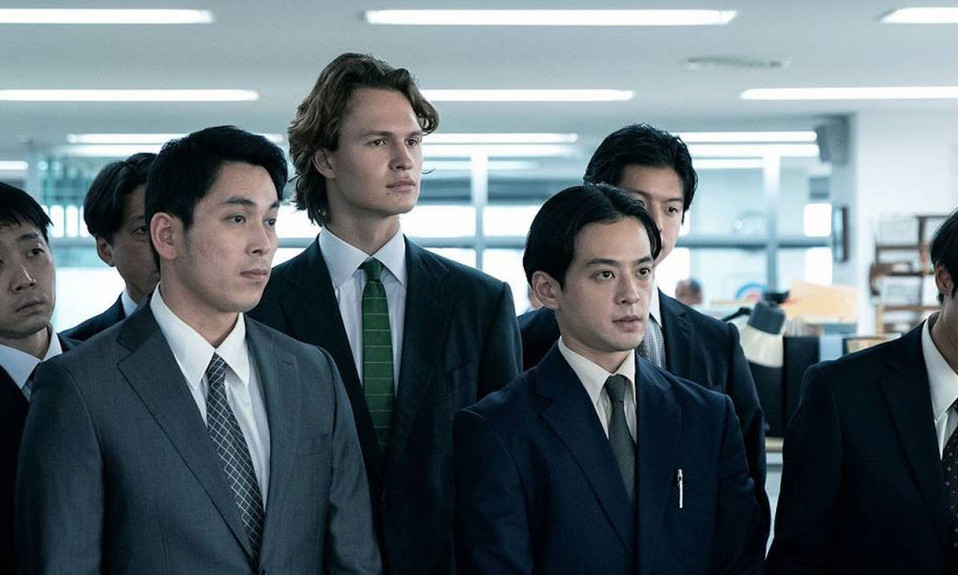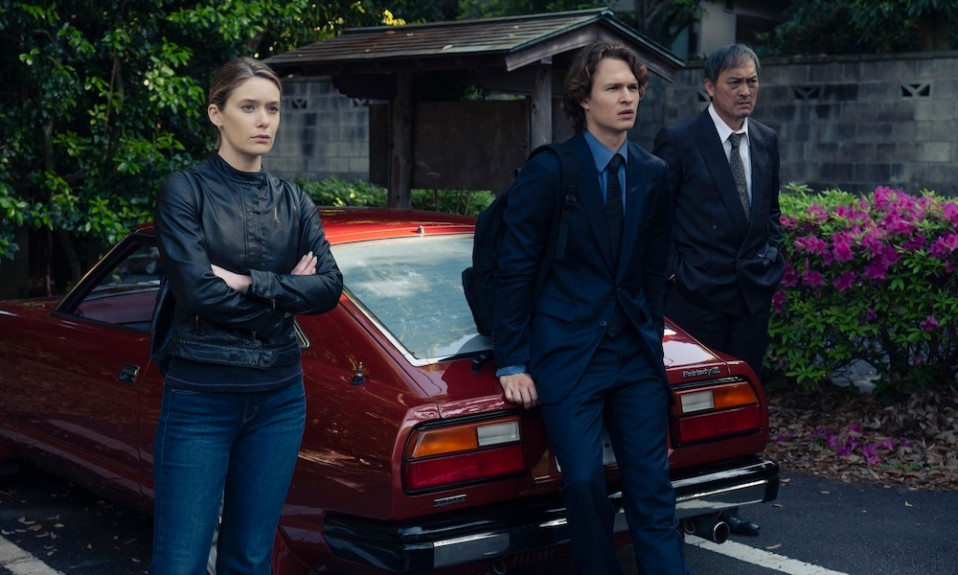The female boss is caught off guard at home by the foreign reporter who sees the abuses she endures, this time different from the newsroom as her body language is more fragile, her face not so flinched and the cracks start to show. The uninvited guest who only wanted to show how much he is willing to go for a scoop accidentally caught more than he should, as the editor has to explain that the aggressive man is her mentally ill brother who won’t go to work, dismissing the possibility of being a violent husband, but she is still trapped in a toxic environment where she should have some peace since their workplace is not a stroll in a Sunday morning. In another moment, the said reporter can see how the veteran detective he admires is humanized at home, not just a man who seems impervious to fear but a father and husband who can’t allow himself to be so tender as he transits in a game of lies, shadows and looming distress.
Those scenes are taken from the first season of HBO’s Max ‘Tokyo Vice’ released in 2022 and gearing up for its second season, a product based in the homonymous book published in 2007 by American reporter Jake Adelstein who brought to the Western society the underbelly of Japanese organized crime and its gangs known as the yakuza. The series protagonist is a version of Adelstein played by American heartthrob Ansel Elgort (Baby Driver) who shows depth in his portrayal, the narrative also features Academy-nominated Japanese luminaries Rinko Kikuchi (Babel) and Ken Watanabe (Last Samurai), who play Jake’s editor at the main Japanese newspaper and the policeman, respectively. The series is rounded by other international talent and the locals show what they can do with a material that goes far from the stereotyped images that are seen in mainstream media.
‘Tokyo Vice’ is executive produced by Michael Mann, the director of ‘Heat’ who held the same position in the quintessential 80’s show ‘Miami Vice,’ from which Adelstein confessed to me to be a great fan and borrowed the name for his story. Like the Floridian ‘Vice,’ the Japanese counterpart presents its players with flair, surrounded in a lavish environment inhabited by good-looking people, but all infused with darkness that corrodes its players from the inside straying away from the critics who might say that both shows glamourize the criminal lifestyle.
In ‘Tokyo Vice,’ the most gripping scenes are those where everything seems to be calm, as the air is filled with the possibility of violence that ends with lives abruptly in a nihilistic manner much like in the real world of those nightcrawlers. The show follows another Mann speciality by portraying how work life can harm personal lives and leave everlasting damages, an aftermath lived by Adelstein who lost many cherished ones and while carrying physical and psychological traumas that the series helps to understand due to character evolution.
In the case of the journalists, it shows how this profession can be not only demanding but humiliating and also portrays Japanese corporate culture without holding back, Adelstein suffers from being a “gaijin” (foreigner) in a homogenous place, still Kikuchi’s Emi represents what women journalists still endure in the press and in Japanese society as a whole.
Cops, thugs and night workers aren’t spared either as these people are stuck in a game of power while also playing against themselves for the little space available in what outsiders mistake for glamour and excitement. The clothing department shines in particular when the salary people are put close to the members of the yakuza or from other spheres of power, although Adelstein tries to come as elegant and debonair as possible, the fabric and colours of his suits denounce his place in the gaming board.
As expected in a Michael Mann production, it feels more like a movie than television due to cinematography, editing and soundtrack, even when we look at the current prestige TV. Its noir cinema influence pours on how Adelstein has a moral core, but he is not restrained by it like a self-righteous journalist, his unorthodox methods play a role in his competent journalistic skills which helps to understand why the real-life Adelstein is one of the best storytellers of his generation.
Adelstein swims in a pool of greyness as he doesn’t shy away from sleeping with hostesses, prostitutes, and other women. Still, he is not also revered by this behaviour as if he is an alpha male character, it fits the narrative by showing his humanity, and his womanizing ways are not complimented nor condemned, and they help to understand the character and the plot.
In its way, ‘Tokyo Vice’ shows a deeper Japan that is not tied to anime or kaiju nor restricted to high-art cinema circuits, actors like Watanabe and Kikuchi are already recognized although they show some shades not very much seen in their forays in American mainstream products, but ‘Tokyo Vice’ also brings talents like Hideaki Itō (Umizaru) playing a conflicted cop who wants to be seen as a flamboyant superstar or the novice gangster Sato who under the acting of Shô Kasamatsu goes through a large character development and can be perceived as its second protagonist and a counterpart, not an antagonist, to Elgort’s Adelstein.
By having veteran yakuza movies actor Shun Sugata (Ichi the Killer), it pays homage to a very popular Japanese genre, as Sugata plays a supposedly honourable mob boss pointing toward a past that, like him, is not as romantic as meets the eyes. A ranged acting that demands the viewer’s attention.
Vice is also a document of an era, the 90’s and early 2000’s Japanese country in a country that was starting to leave the notion that it was becoming an economic powerhouse due to the 80’s economic boom, but haven’t yet dealt with terrorist attacks and the ageing of its population while trying to deny that its youth was coping with more than they can handle and unassisted.
Sadly, the real Adelstein has not only to deal with the toll of his journey and life-threatening events but also to mediatic hit jobs that coincidently came around during awards season which might have taken a bit of the series’ steam, where members of the technical team and the talents of Watanabe, Itō and Kikuchi shouldn’t have been overlook in said ceremonies.
In ‘Tokyo Vice,’ the supporting players have full-fledged lives, and their suffering and joy aren’t just stepping stones to show how Adelstein is good thus making the accusations of playing to the “white saviour” trope being unfounded, the American reporter is a point-of-view character and not a demigod that came to put an end to the yakuza and the corruption in Japan.
‘Tokyo Vice’ is flashy like the city’s brimming 90s and early 2000s nightlife which makes those moments of discretion in the characters’ homes hit even harder and sets it aside from contemporary American series that aim to portray law enforcement and other classes as unwavering heroes of American exceptionalism. ‘Tokyo Vice’ deserves a meticulous look as it is one of the best crime dramas of today.
Also Read: How Anime Went International













